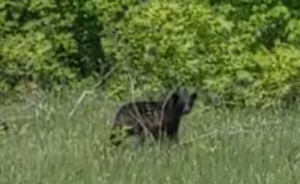‘Boozhoo Makwa’s and welcome home to Aazhoodena,’ says Kettle and Stony Point First Nation Chief Henry

By Colin Graf
KETTLE & STONY POINT FIRST NATION— Excitement has been stirring in and around the community on the southern shore of Lake Huron due to a number of recent black bear sightings in the area.
Rudy Bressette Jr., his brother Tyler, and nephew Kobey were heading for some fishing at the inland lakes in the woods at Stony Point, the former Canadian army Camp Ipperwash in the process of being returned to the community, when they saw a bear cross the road about 800m in front of their vehicle on May 30. Bressette readied his camera, rolled down the window and caught a few moments of the solitary bear heading into the woods on video. While he heard a story of a bear from his grandfather over 10 years ago, Bressette admits bear sightings in the area are unexpected.
“Many people around here have never seen one.”
Since then, bear sightings have been reported several times on Facebook, including one by Kettle Point and Stony Point member Doug George, who says the animal has been around since last fall at least. George and his wife were sitting on their semi-enclosed porch before the first snow when they heard sticks snapping and heavy breathing outside of their home, located across the road from where the community garbage dumpsters are located. Usually, if anyone was on the road, dogs living nearby would be barking, but not this time, George says.
“It was so quiet, we even heard a grunt,” he recalls.
Then, on May 31, the day following the Bressettes’ sighting, George was driving home when he suddenly saw a creature and slowed down as it crossed the road just 20ft in front of him, heading for the dumpsters.
“I pulled in and told my wife, ‘I just saw that bear.’”
George says Kettle and Stony Point First Nation Chief Jason Henry has told him bears have been in and around the community since last year. George says the Chief said he knew of a bear that could have possibly had cubs last year. The Chief has asked the community to leave the bear(s) alone.
“Some of you may have seen the recent video of the black bear at Stony Point. Please don’t disturb them, they too just want to return home to Aazhoodena to live in peace on their territory. Please don’t shoot them, don’t scare them, they have been in Stony since last spring and have not harmed anyone. Boozhoo Makwa’s and welcome home to Aazhoodena,” he wrote in a recent Facebook post.
While Doug George claims “zero worries” about the bears in the community, he says his children, 11 and 14, have been told not to ride their bikes or walk on the bush trails on their own.
The bears do seem to be turning up all over the area since the Bressettes’ first sighting. One long-term resident in the area noted that he had never seen a bear in the area until one visited his property several times in the first week of June, returning even after he removed bird feeders that may have attracted the animal. Another resident posted nighttime security camera footage of a bear that explored front and back yards and ransacked bird feeders.
George says he has even read one report of a bear climbing a pool ladder and going for a swim in an above-ground pool in the nearby town of Port Franks. Still, he says most people are taking the news pretty calmly.
“I have yet to hear anyone say, ‘These bears need to be picked up and relocated far away, they’re a danger.’ Hey, we’re in the bears’ habitat. This is their home. We need to learn to live with the bears.”
A spokesperson for Ontario’s Ministry of Natural Resources and Forests says there are steps people can take to keep bears away from their property, such as removing items such as bird feeders that would attract them. Since bears’ sense of smell is “phenomenal,” Jolanta Kowalski says people need to make sure their garbage is inside a solid building and should only be put out on the morning of pickup. To “keep smells under control” having your barbecue as clean as possible is also a good idea, she adds.
Bear sightings are unusual for the area, but not rare, according to Kowalski.
“We usually get a few sightings from down that way every year,” she says.
While black bear attacks are extremely rare in Ontario, “whatever you do, don’t feed them,” she advises.
“That causes huge problems and can end up with the bear being dead.”
A bear will return to the same area where it found food before, and if it becomes habituated to human food “that’s more likely to lead them to behaviour that may get them killed as a public safety measure,” she explains.
The chances of encountering a bear in the southwest are much less likely than in other regions in Ontario, but people may want to wear bells and carry bear spray if they are heading into areas of known bear activity, she says.
Further information is available on the MNRF’s Bear Wise webpage.


